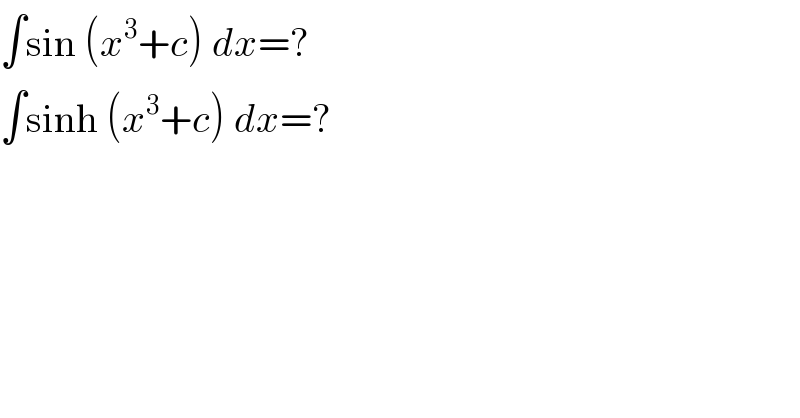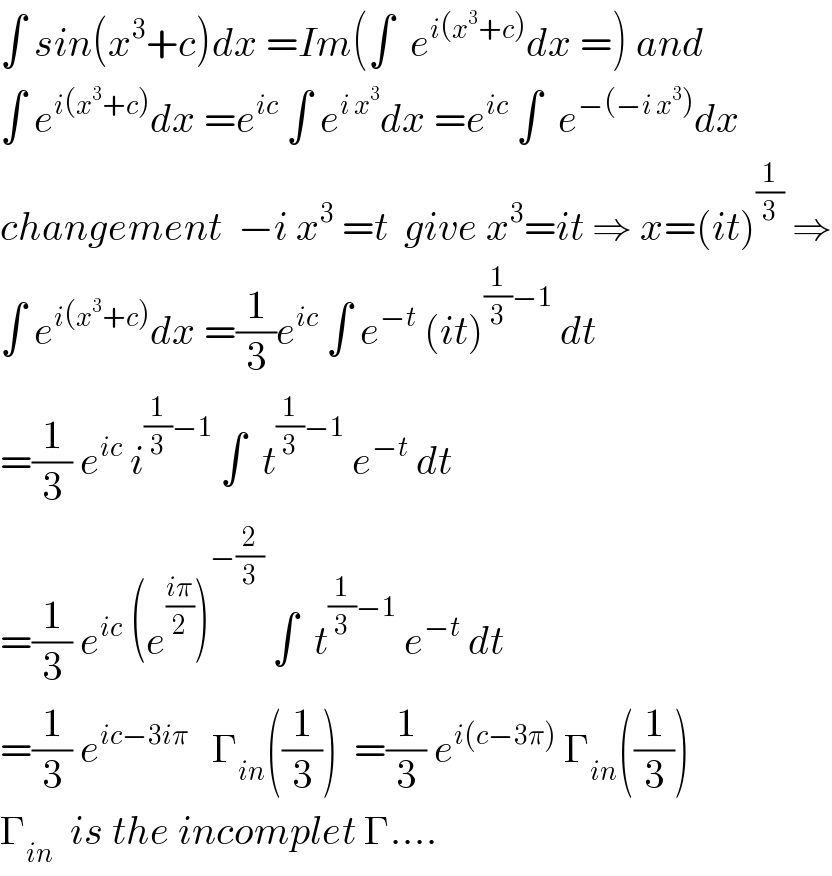Question Number 75089 by MJS last updated on 07/Dec/19

$$\int\mathrm{sin}\:\left({x}^{\mathrm{3}} +{c}\right)\:{dx}=? \\ $$$$\int\mathrm{sinh}\:\left({x}^{\mathrm{3}} +{c}\right)\:{dx}=? \\ $$
Commented by mathmax by abdo last updated on 07/Dec/19

$$\int\:{sin}\left({x}^{\mathrm{3}} +{c}\right){dx}\:={Im}\left(\int\:\:{e}^{{i}\left({x}^{\mathrm{3}} +{c}\right)} {dx}\:=\right)\:{and} \\ $$$$\int\:{e}^{{i}\left({x}^{\mathrm{3}} +{c}\right)} {dx}\:={e}^{{ic}} \:\int\:{e}^{{i}\:{x}^{\mathrm{3}} } {dx}\:={e}^{{ic}} \:\int\:\:{e}^{−\left(−{i}\:{x}^{\mathrm{3}} \right)} {dx} \\ $$$${changement}\:\:−{i}\:{x}^{\mathrm{3}} \:={t}\:\:{give}\:{x}^{\mathrm{3}} ={it}\:\Rightarrow\:{x}=\left({it}\right)^{\frac{\mathrm{1}}{\mathrm{3}}} \:\Rightarrow \\ $$$$\int\:{e}^{{i}\left({x}^{\mathrm{3}} +{c}\right)} {dx}\:=\frac{\mathrm{1}}{\mathrm{3}}{e}^{{ic}} \:\int\:{e}^{−{t}} \:\left({it}\right)^{\frac{\mathrm{1}}{\mathrm{3}}−\mathrm{1}} \:{dt} \\ $$$$=\frac{\mathrm{1}}{\mathrm{3}}\:{e}^{{ic}} \:{i}^{\frac{\mathrm{1}}{\mathrm{3}}−\mathrm{1}} \:\int\:\:{t}^{\frac{\mathrm{1}}{\mathrm{3}}−\mathrm{1}} \:{e}^{−{t}} \:{dt} \\ $$$$=\frac{\mathrm{1}}{\mathrm{3}}\:{e}^{{ic}} \:\left({e}^{\frac{{i}\pi}{\mathrm{2}}} \right)^{−\frac{\mathrm{2}}{\mathrm{3}}} \:\int\:\:{t}^{\frac{\mathrm{1}}{\mathrm{3}}−\mathrm{1}} \:{e}^{−{t}} \:{dt} \\ $$$$=\frac{\mathrm{1}}{\mathrm{3}}\:{e}^{{ic}−\mathrm{3}{i}\pi} \:\:\:\Gamma_{{in}} \left(\frac{\mathrm{1}}{\mathrm{3}}\right)\:\:=\frac{\mathrm{1}}{\mathrm{3}}\:{e}^{{i}\left({c}−\mathrm{3}\pi\right)} \:\Gamma_{{in}} \left(\frac{\mathrm{1}}{\mathrm{3}}\right) \\ $$$$\Gamma_{{in}} \:\:{is}\:{the}\:{incomplet}\:\Gamma…. \\ $$
Commented by mathmax by abdo last updated on 07/Dec/19

$${forgive}\:\:\int\:{e}^{{i}\left({x}^{\mathrm{3}} +{c}\right)} {dx}\:=\frac{\mathrm{1}}{\mathrm{3}}\:{e}^{{ic}−{i}\frac{\pi}{\mathrm{3}}} \:\:\:\Gamma_{{in}} \left(\frac{\mathrm{1}}{\mathrm{3}}\right)\:\:\Rightarrow \\ $$$${I}\:=\frac{\mathrm{1}}{\mathrm{3}}\Gamma_{{in}} \left(\frac{\mathrm{1}}{\mathrm{3}}\right){sin}\left({c}−\frac{\pi}{\mathrm{3}}\right) \\ $$
Commented by MJS last updated on 07/Dec/19

$$\mathrm{thank}\:\mathrm{you} \\ $$
Commented by mathmax by abdo last updated on 14/Dec/19

$${you}\:{are}\:{welcome}\:{sir}. \\ $$
